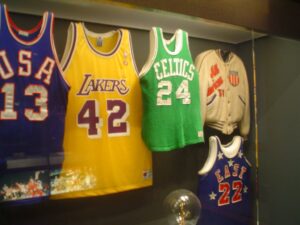
By Elaine Hall, DCI Fellow
When sports teams take to the field, they represent their team with the distinctive outfits they wear. We can tell at a glance who belongs with whom because of their color and style. We recognize our Wildcats by their jerseys, and we can instigate a friendly but intense debate by suggesting that the old logo is cooler than the current one.
Jerseys on sports teams are helpful and fun. However, when we enter our lives as citizens as if we’re wearing the jersey of our preferred political or culture war “team,” we show up ill prepared for the task at hand.[1] Jerseys in our common life are a sign of over-identification with a particular brand to the detriment of our full individuality and problem-solving abilities. To engage in the true work of deliberation, citizenship, and positive change, we need a broader wardrobe to support our engagement.
Political jerseys reinforce our divisions and imply zero sum competition. When the Wildcats take to the court, they must work with their own team and against the other. There will be a final score. Someone will win, and we want that someone to be our own team. There’s little room for reconsidering the desired outcomes or reframing the encounter for a different, more mutually beneficial result. As citizens, we are best served when we mix it up and collaborate. A good move by one’s political opponents is still a good move. Working together toward mutual objectives, even if we have different priorities or strategies, works best if we don’t overly identify with a particular team.
Further, and perhaps more importantly, team jerseys misrepresent the nature of our agency and involvement. When I wear a team jersey, I am identifying myself with other fans. I am also furthering a narrative in which the action happens in a different sphere from the one I inhabit. The real work is done by others (the players on the court) for my entertainment. In our lives as citizens the important outcomes are not professionals scoring political points, but rather citizens working together for better outcomes.
So, if we’re not going to wear political jerseys, how might we dress for healthy deliberation and citizenship? I would suggest that we dress for the work at hand. Sturdy boots and work gloves are ideal when hunters and environmentalists team up to clean trash from the roadside. While addressing the immediate environmental problem at hand, we can also get to know one another and build alliances and strategies around protecting the land we all love. Comfortable shoes and pants in which you can sit on the floor for circle time work best when volunteering or substitute teaching at a local school. Providing immediate, practical support to kids and staff in schools allows us to understand the challenges at hand and build common cause with others who care about young people and education, even if we have different ideas about what books should be on the reading list.
When we show up to deliberate, we can and should come in all the many colors, styles, and shades that represent us in our full, nuanced humanity. When we reject simple us/them categories, claim our agency and engagement, and get to work, we set ourselves and our democracy up for success.
If you liked this post, check out a previous DCI blog post, “One Team,” that also talks about the pitfalls of “teamsmanship” and the value of thinking about ourselves as on the same team – rather than opposing teams — when we talk about politics.
[1] Thanks to Beth Silvers and Sarah Stewart Holland for the image of political jerseys from their 2019 book, I Think You’re Wrong, But I’m Listening https://plcmc.overdrive.com/media/4127787?utm_campaign=searchfeed&utm_source=google

Leave a Reply